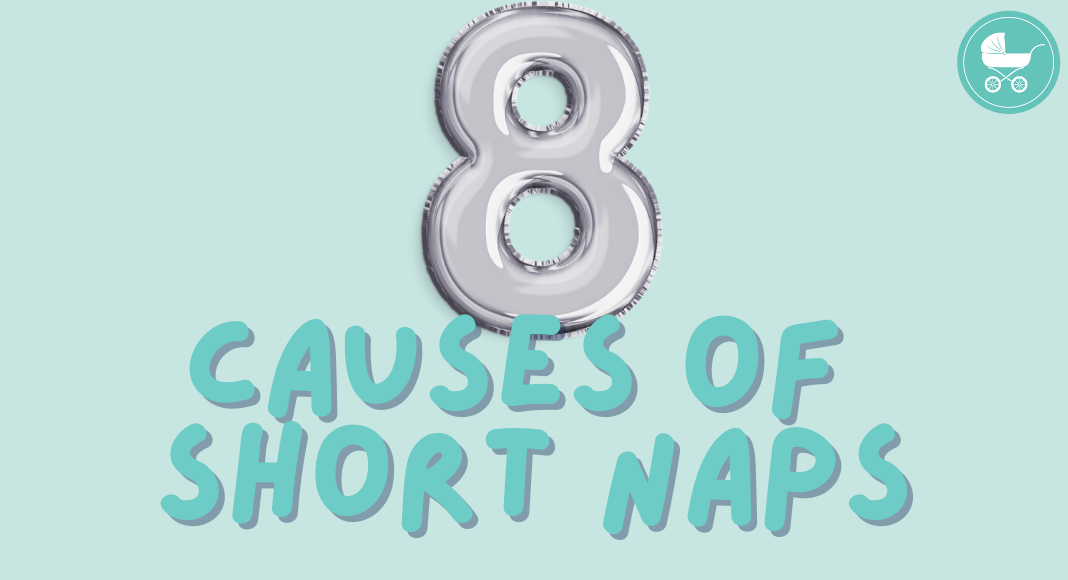
December 6, 2022
One of the most-asked questions we get as sleep consultants is how to stop the dreaded catnaps. And we get it. Regular naps (that are at least an hour long) not only help a baby stay happier during the day and sleep better at night, but they also give mom and dad some much needed […]
Eight Causes of Short Naps
One of the most-asked questions we get as sleep consultants is how to stop the dreaded catnaps. And we get it. Regular naps (that are at least an hour long) not only help a baby stay happier during the day and sleep better at night, but they also give mom and dad some much needed down time during the day.
Here are the eight causes of short naps and what to do about them:
Overtiredness:
Have you ever been so tired that you’ve found it hard to settle down at night? Babies experience this, too, except ten-fold. Often times parents think that the longer their child stays awake, the better they will sleep when it’s time to rest, but nothing could be further from the truth! If you think your baby is taking short naps due to overtiredness, try putting her down for her nap the minute you notice her sleep signs. Sleep signs can include: eye rubbing, yawning, slowed activity, listlessness, limpness, zoning out or staring blankly, and/or whining and fussing, to name a few. Each child has his or her own sleep signs, but after a while you should be able to pick up what signs are unique to your baby. If you have trouble identifying those subtle cues, try putting your baby down for her nap about 20-30 minutes earlier than you usually do. It might take a few days, but adjusting her naptime could lengthen her naps. For more tips on how to put an overtired baby to bed, check out this post!
Room Environment
When identifying the cause of any sleep problem your baby might be experiencing, consider the environment where he or she sleeps. If your baby’s room is flooded with natural light, consider installing blackout shades or curtains. Is your baby’s room too hot or too cold? We recommend keeping the room between 68-72 degrees Fahrenheit. Do you live in a noisy part of town, or do you have an older child who plays while your baby naps? White noise machines do a great job of drowning out ambient noises. We recommend the Marpac DOHM-DS, Natural White Noise Sound Machine and the HoMedics Sound Spa Relaxation Machine
..
Sleep Associations
This is a big one. If you are holding or rocking your baby to sleep and she’s waking up after 30 minutes, it’s probably because she is shifting through stages of sleep and realizing that you’re not holding her anymore. (It’s like going to sleep on your favorite pillow and then waking up in the garage!) The same is true for pacifiers: if your baby falls asleep with a pacifier and isn’t able to replace it on her own, she will likely wake up expecting you to do it (and by that point she’ll probably be good and awake!) So what can you do about these sleep associations? There are many ways you can help teach your baby to fall asleep on her own. Check out this blog post on how to break the most 10 common baby sleep habits.
No Naptime Routine
While we encourage parents to be flexible, we also stress that consistency is very important, especially for younger babies and toddlers. It’s important to have a solid routine for your child, which means putting him down for his nap around the same time and in the same place each day. Does this mean you can never leave the house? No! But for the first few weeks, while you’re establishing your routine, it’s a good idea to be home for at least one nap. Having a set routine lets your child know what to expect (and when!). You might find that when naptime rolls around, your baby or toddler will eventually walk to his crib and ask to take a nap! (We also recommend having a naptime routine. This can be a shorter version of your child’s bedtime routine and can set the tone for a nice, long nap!)
Inconsistency With The Approach
On that same note, if you’re sleep coaching your baby or toddler for naps, be sure to use the same approach for at least a week. For example, we often recommend The Sleep Shuffle to help babies break sleep habits, but this can take a few days – maybe even a week – before a parent starts to see progress. Giving up half way through the process only confuses your baby, so when you pick a method stick to it for at least a week.
Hunger
Often times we find that babies will wake early from their naps due to hunger. If you think this is the case, try nursing or providing a light snack right before his nap. But be careful! Try not to nurse your baby to sleep or give snacks that are high in sugar. Here’s a list of foods to avoid before naptime.
Lack of Sunlight Exposure
Children need an extra boost of sunshine to sleep better and adjust their biological clocks. Get outside as often as you can — ideally in the early morning and in the late afternoon.
The Body Clock Needs to be Reset
If you’ve tried everything above consistently and still aren’t seeing results, your baby might just be in the habit of waking up after 30-45 minutes. Consider the Wake To Sleep Approach: start off by going into your child’s room 10 minutes before she usually wakes up. (You might need to keep a log for a few days to get an idea of exactly how many minutes she actually naps.) Gently rub her cheek or head until she BARELY stirs and then stop. The goal isn’t to wake your baby up but to gently stir her in her sleep. If you aren’t sure if your baby moved, wait a minute or two and try it again. If your baby does wake up after being stirred, you can try doing the Wake-To-Sleep approach a few minutes earlier during the next nap. Don’t give up! Timing is everything.
We hope you found these tips helpful, but if you’re still have trouble with a chronic catnapper, give us a call! We’re here to help and can develop a customized sleep plan for your family or schedule your free consultation today!
Get instant access to our free sleep class for children from newborn to 5 years old. You will learn how to get your child to sleep independently -- and all through the night!
Get Your Child To Sleep All Night Long in as Little as 7 Days!
join the free class
THE CLASS

